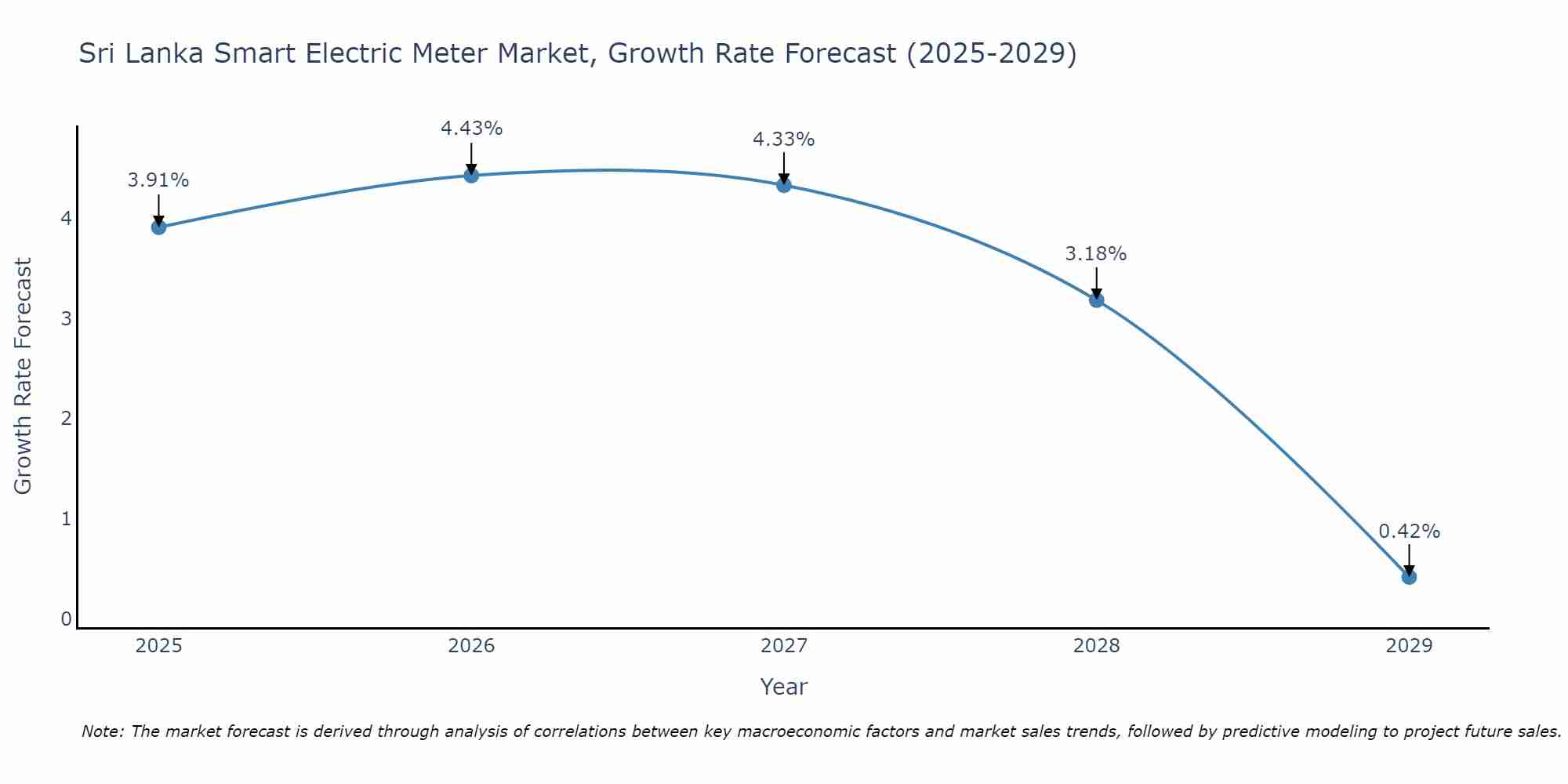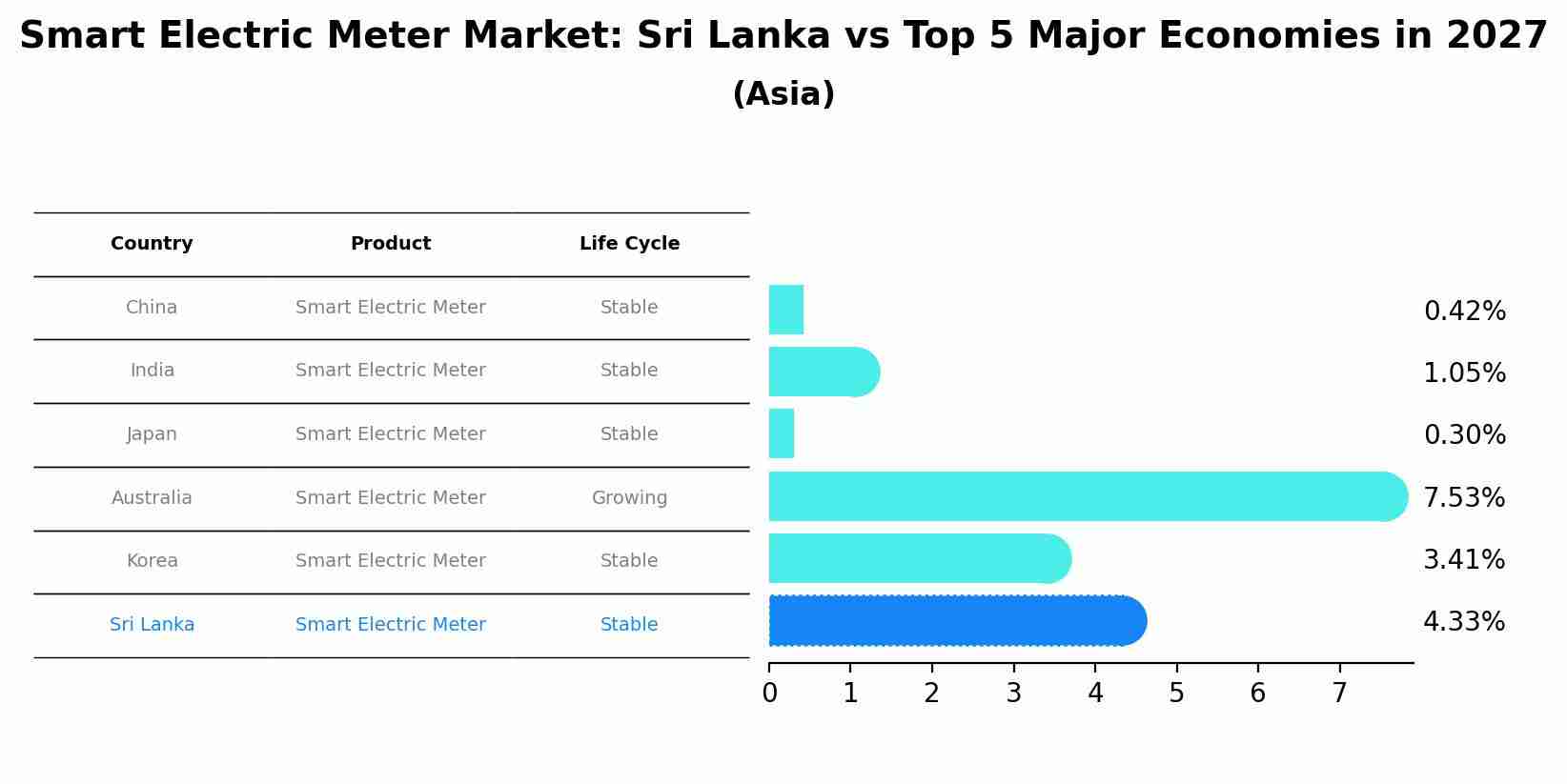Sri Lanka Smart Electric Meter Market Outlook | Value, Growth, Trends, Revenue, Forecast, COVID-19 IMPACT, Size, Companies, Share, Analysis & Industry
| Product Code: ETC369331 | Publication Date: Aug 2022 | Updated Date: Jul 2025 | Product Type: Market Research Report | |
| Publisher: 6Wresearch | Author: Summon Dutta | No. of Pages: 75 | No. of Figures: 35 | No. of Tables: 20 |
Sri Lanka Smart Electric Meter Market Size Growth Rate
The Sri Lanka Smart Electric Meter Market is projected to witness mixed growth rate patterns during 2025 to 2029. Growth accelerates to 4.43% in 2026, following an initial rate of 3.91%, before easing to 0.42% at the end of the period.

Smart Electric Meter Market: Sri Lanka vs Top 5 Major Economies in 2027 (Asia)
The Smart Electric Meter market in Sri Lanka is projected to grow at a stable growth rate of 4.33% by 2027, within the Asia region led by China, along with other countries like India, Japan, Australia and South Korea, collectively shaping a dynamic and evolving market environment driven by innovation and increasing adoption of emerging technologies.

Sri Lanka Smart Electric Meter Market Synopsis
The Sri Lanka Smart Electric Meter Market is experiencing steady growth driven by increasing investments in smart grid infrastructure and government initiatives promoting energy efficiency. Smart meters are being deployed to modernize the country`s electricity grid, improve billing accuracy, and enhance energy management. The market is witnessing a shift from traditional meters to smart meters due to benefits such as remote monitoring, real-time data analytics, and demand response capabilities. Key players in the market are focusing on technological advancements and strategic partnerships to expand their market presence. Factors such as growing urbanization, rising electricity demand, and the need for efficient energy management solutions are expected to further drive the growth of the Smart Electric Meter Market in Sri Lanka.
Sri Lanka Smart Electric Meter Market Trends
The Smart Electric Meter Market in Sri Lanka is experiencing significant growth due to increasing urbanization, industrialization, and government initiatives promoting energy efficiency. Key trends include the adoption of advanced metering infrastructure (AMI) technology to enable two-way communication between utilities and consumers, facilitating real-time monitoring and control of electricity usage. Demand for smart meters is also being driven by the need for accurate billing, reduction of non-technical losses, and integration with smart grid systems. Additionally, the rising awareness among consumers about energy conservation and the benefits of smart meters is fueling market growth. Leading players in the Sri Lankan smart electric meter market are focusing on product innovations, partnerships with utility companies, and expanding their distribution networks to capitalize on the growing opportunities in the market.
Sri Lanka Smart Electric Meter Market Challenges
In the Sri Lanka Smart Electric Meter Market, challenges include the high initial investment cost for implementing smart metering infrastructure, the need for skilled technicians to install and maintain the meters, and the lack of awareness among consumers about the benefits of smart meters. Additionally, issues related to data privacy and security concerns may hinder the widespread adoption of smart electric meters. Regulatory challenges such as ensuring interoperability among different metering systems and addressing policy barriers could also pose obstacles to market growth. Overall, overcoming these challenges will require collaborative efforts among stakeholders, including government bodies, utility companies, technology providers, and consumers, to drive the successful deployment and integration of smart electric meters in Sri Lanka.
Sri Lanka Smart Electric Meter Market Investment Opportunities
In the Sri Lanka Smart Electric Meter Market, there are promising investment opportunities for companies involved in the development, manufacturing, and distribution of smart electric meters. With the country`s increasing focus on energy efficiency and sustainability, there is a growing demand for smart metering solutions that allow for real-time monitoring, accurate billing, and improved grid management. As the Sri Lankan government aims to modernize its energy infrastructure and promote renewable energy sources, the adoption of smart meters is expected to rise. Investors can capitalize on this trend by entering partnerships with utility companies, offering innovative metering technologies, and providing comprehensive energy management solutions. Additionally, the market presents opportunities for data analytics and software companies to develop smart grid solutions that enhance operational efficiency and customer engagement.
Jordan Agar Market Government Policies
The Sri Lankan government has implemented several policies to promote the adoption of smart electric meters in the country. One key policy is the Smart Grid Roadmap, which aims to modernize the electricity infrastructure by promoting the deployment of smart meters. The government has also introduced initiatives such as the Smart Energy Consumer program to educate consumers on the benefits of smart meters and encourage their uptake. Additionally, the Public Utilities Commission of Sri Lanka has set regulations to ensure the interoperability and security of smart metering systems. These policies are aimed at improving energy efficiency, reducing electricity theft, and enhancing overall grid reliability in Sri Lanka through the widespread adoption of smart electric meters.
Sri Lanka Smart Electric Meter Market Future Outlook
The Sri Lanka Smart Electric Meter market is expected to witness significant growth in the coming years due to increasing government initiatives for modernizing the electricity infrastructure and promoting energy efficiency. The deployment of smart meters will enable utilities to better monitor and manage electricity consumption, reduce operational costs, and improve overall grid reliability. Additionally, the rising awareness among consumers regarding the benefits of smart meters in optimizing energy usage and reducing bills is projected to drive market growth. Technological advancements such as integration with IoT and cloud-based platforms are further expected to enhance the capabilities of smart meters in Sri Lanka. Overall, the market is anticipated to experience steady expansion as the country continues to focus on enhancing its energy infrastructure.
Key Highlights of the Report:
- Sri Lanka Smart Electric Meter Market Outlook
- Market Size of Sri Lanka Smart Electric Meter Market, 2021
- Forecast of Sri Lanka Smart Electric Meter Market, 2031
- Historical Data and Forecast of Sri Lanka Smart Electric Meter Revenues & Volume for the Period 2018 - 2031
- Sri Lanka Smart Electric Meter Market Trend Evolution
- Sri Lanka Smart Electric Meter Market Drivers and Challenges
- Sri Lanka Smart Electric Meter Price Trends
- Sri Lanka Smart Electric Meter Porter's Five Forces
- Sri Lanka Smart Electric Meter Industry Life Cycle
- Historical Data and Forecast of Sri Lanka Smart Electric Meter Market Revenues & Volume By Phase for the Period 2018 - 2031
- Historical Data and Forecast of Sri Lanka Smart Electric Meter Market Revenues & Volume By Single for the Period 2018 - 2031
- Historical Data and Forecast of Sri Lanka Smart Electric Meter Market Revenues & Volume By Three for the Period 2018 - 2031
- Historical Data and Forecast of Sri Lanka Smart Electric Meter Market Revenues & Volume By Communication Technology Type for the Period 2018 - 2031
- Historical Data and Forecast of Sri Lanka Smart Electric Meter Market Revenues & Volume By Power Line Communication (PLC) for the Period 2018 - 2031
- Historical Data and Forecast of Sri Lanka Smart Electric Meter Market Revenues & Volume By Radio Frequency (RF) for the Period 2018 - 2031
- Historical Data and Forecast of Sri Lanka Smart Electric Meter Market Revenues & Volume By Cellular for the Period 2018 - 2031
- Historical Data and Forecast of Sri Lanka Smart Electric Meter Market Revenues & Volume By End-Users for the Period 2018 - 2031
- Historical Data and Forecast of Sri Lanka Smart Electric Meter Market Revenues & Volume By Industrial for the Period 2018 - 2031
- Historical Data and Forecast of Sri Lanka Smart Electric Meter Market Revenues & Volume By Commercial for the Period 2018 - 2031
- Historical Data and Forecast of Sri Lanka Smart Electric Meter Market Revenues & Volume By Residential for the Period 2018 - 2031
- Sri Lanka Smart Electric Meter Import Export Trade Statistics
- Market Opportunity Assessment By Phase
- Market Opportunity Assessment By Communication Technology Type
- Market Opportunity Assessment By End-Users
- Sri Lanka Smart Electric Meter Top Companies Market Share
- Sri Lanka Smart Electric Meter Competitive Benchmarking By Technical and Operational Parameters
- Sri Lanka Smart Electric Meter Company Profiles
- Sri Lanka Smart Electric Meter Key Strategic Recommendations
Frequently Asked Questions About the Market Study (FAQs):
- Single User License$ 1,995
- Department License$ 2,400
- Site License$ 3,120
- Global License$ 3,795
Search
Thought Leadership and Analyst Meet
Our Clients
Related Reports
- Canada Oil and Gas Market (2026-2032) | Share, Segmentation, Value, Industry, Trends, Forecast, Analysis, Size & Revenue, Growth, Competitive Landscape, Outlook, Companies
- Germany Breakfast Food Market (2026-2032) | Industry, Share, Growth, Size, Companies, Value, Analysis, Revenue, Trends, Forecast & Outlook
- Australia Briquette Market (2025-2031) | Growth, Size, Revenue, Forecast, Analysis, Trends, Value, Share, Industry & Companies
- Vietnam System Integrator Market (2025-2031) | Size, Companies, Analysis, Industry, Value, Forecast, Growth, Trends, Revenue & Share
- ASEAN and Thailand Brain Health Supplements Market (2025-2031) | Strategy, Consumer Insights, Analysis, Investment Trends, Opportunities, Growth, Size, Share, Industry, Revenue, Segments, Value, Segmentation, Supply, Forecast, Restraints, Outlook, Competition, Drivers, Trends, Demand, Pricing Analysis, Competitive, Strategic Insights, Companies, Challenges
- ASEAN Bearings Market (2025-2031) | Strategy, Consumer Insights, Analysis, Investment Trends, Opportunities, Growth, Size, Share, Industry, Revenue, Segments, Value, Segmentation, Supply, Forecast, Restraints, Outlook, Competition, Drivers, Trends, Demand, Pricing Analysis, Competitive, Strategic Insights, Companies, Challenges
- Europe Flooring Market (2025-2031) | Outlook, Share, Industry, Trends, Forecast, Companies, Revenue, Size, Analysis, Growth & Value
- Saudi Arabia Manlift Market (2025-2031) | Outlook, Size, Growth, Trends, Companies, Industry, Revenue, Value, Share, Forecast & Analysis
- Uganda Excavator, Crane, and Wheel Loaders Market (2025-2031) | Strategy, Consumer Insights, Analysis, Investment Trends, Opportunities, Growth, Size, Share, Industry, Revenue, Segments, Value, Segmentation, Supply, Forecast, Restraints, Outlook, Competition, Drivers, Trends, Demand, Pricing Analysis, Competitive, Strategic Insights, Companies, Challenges
- Rwanda Excavator, Crane, and Wheel Loaders Market (2025-2031) | Strategy, Consumer Insights, Analysis, Investment Trends, Opportunities, Growth, Size, Share, Industry, Revenue, Segments, Value, Segmentation, Supply, Forecast, Restraints, Outlook, Competition, Drivers, Trends, Demand, Pricing Analysis, Competitive, Strategic Insights, Companies, Challenges
Industry Events and Analyst Meet
Whitepaper
- Middle East & Africa Commercial Security Market Click here to view more.
- Middle East & Africa Fire Safety Systems & Equipment Market Click here to view more.
- GCC Drone Market Click here to view more.
- Middle East Lighting Fixture Market Click here to view more.
- GCC Physical & Perimeter Security Market Click here to view more.
6WResearch In News
- Doha a strategic location for EV manufacturing hub: IPA Qatar
- Demand for luxury TVs surging in the GCC, says Samsung
- Empowering Growth: The Thriving Journey of Bangladesh’s Cable Industry
- Demand for luxury TVs surging in the GCC, says Samsung
- Video call with a traditional healer? Once unthinkable, it’s now common in South Africa
- Intelligent Buildings To Smooth GCC’s Path To Net Zero


















